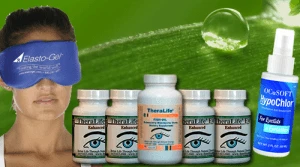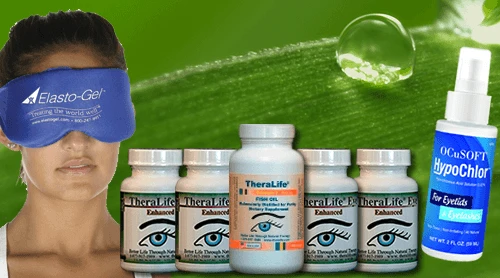To help soothe eyelid inflammation, incorporating omega-3-rich foods like salmon, flaxseeds, and walnuts, along with antioxidant-rich fruits, veggies, and whole grains can be beneficial. Limiting processed foods and refined sugars and using anti-inflammatory spices such as turmeric and ginger in your meals are also recommended. Staying hydrated and including probiotics from yogurt or kefir can support overall eye comfort. Tracking symptoms and adjusting your diet accordingly can make a difference.
Theralife’s products can significantly benefit those experiencing eyelid inflammation. With a focus on natural and holistic approaches, Theralife offers supplements designed to address dry eyes, blepharitis, and other related conditions. These products work in synergy with dietary changes to enhance eye health and comfort. By integrating Theralife’s offerings with the right food choices, individuals can better manage their symptoms and improve their overall eye wellness.
Best Eyelid Inflammation Treatment From TheraLife- When Drops Don’t Work.
Add To CartAdd To Cart
Key Takeaways
- Increase intake of omega-3 fatty acids from sources like salmon, flaxseeds, and walnuts to help support overall inflammation control.
- Choose whole grains over refined grains to boost fiber and support a healthy gut, which may influence inflammation.
- Incorporate antioxidant-rich foods such as berries, spinach, and nuts to reduce oxidative stress and promote cell health.
- Limit processed foods and added sugars, opting instead for fresh fruits, vegetables, and natural sweeteners to support general wellness.
- Stay well-hydrated with water and eat fermented foods like yogurt to encourage a balanced gut microbiome, potentially supporting inflammation management.
Understanding the Link Between Diet and Eyelid Inflammation
Although you might hear claims that certain foods can directly cause or cure eyelid inflammation, current scientific evidence doesn’t support a strong link between diet and this condition.
Most cases of eyelid inflammation, such as blepharitis, are associated with skin conditions or bacterial issues rather than what you eat. You might come across suggestions to use dietary supplements or herbal remedies, but robust clinical studies are lacking.
Some people report symptom relief from specific supplements, yet their effectiveness and safety aren’t well-established. If you’re considering herbal remedies or over-the-counter dietary supplements, consult your healthcare provider first.
Incorporating anti-inflammatory foods like omega-3 fatty acids and selenium-rich options in your diet could be beneficial, although more research is needed to confirm their direct impact on eyelid inflammation.
Focus on a balanced diet, avoid triggers like allergens if they’re known, and follow good eyelid hygiene. This practical approach aligns best with current research and medical advice.
Foods Rich in Omega-3 Fatty Acids for Calming Inflammation
While you may hear that omega-3 fatty acids can reduce inflammation throughout the body, scientific evidence doesn’t support claims that eating more omega-3-rich foods will calm eyelid inflammation specifically.
Still, adding omega 3 sources to your diet—like salmon, sardines, chia seeds, flaxseeds, and walnuts—can benefit overall health, including heart and eye function.
If you don’t regularly eat these foods, dietary supplements such as fish oil or algal oil can help fill the gap. Before starting supplements, talk with your healthcare provider, as they’re not risk-free and may interact with other medications.
Although omega-3s alone aren’t a proven solution for eyelid inflammation, choosing a balanced diet that includes these nutrients supports your body’s general well-being and may promote healthier eyes overall.
TheraLife Omega-3 is known for its molecular distillation process, which ensures the removal of impurities such as mercury and PCBs, enhancing the quality and safety of the supplement.
Best Eyelid Inflammation Treatment From TheraLife- When Drops Don’t Work.
Add To CartAdd To Cart
The Role of Antioxidants in Reducing Eyelid Swelling
Just as omega-3 fatty acids support overall eye health, you might wonder if antioxidants can help with eyelid swelling.
Research shows that antioxidants, which you’ll find in foods like berries, spinach, and nuts, help protect cells from oxidative stress that can worsen inflammation, including around the eyes. By targeting free radicals, antioxidants may promote the body’s natural response to irritation and swelling of the eyelids.
You can boost your intake through whole foods, but dietary supplements—such as vitamins C and E—are also popular antioxidant sources.
It’s best to focus on a varied diet rich in colorful fruits and vegetables before turning to supplements, as getting nutrients from food guarantees better absorption and fewer risks.
Still, if deficiencies exist, supplements might play a helpful role.
Additionally, for individuals with autoimmune conditions, the AIP diet can offer benefits by reducing inflammation and potentially alleviating symptoms.
Incorporating Anti-Inflammatory Spices Into Your Meals
You can boost your meals with spices like turmeric, ginger, and cinnamon, all of which have research-backed anti-inflammatory effects. Turmeric’s curcumin may help ease swelling, while ginger has soothing properties and cinnamon might support overall eye health. Try adding these spices to soups, smoothies, or teas for practical and flavorful ways to support your eyelid comfort. Ocular rosacea is an inflammatory condition that affects many, and early treatment is crucial to prevent potential complications and maintain eye health.
Turmeric’s Curcumin Power
Turmeric has gained popularity as a culinary spice with potential anti-inflammatory properties, largely attributed to its active compound, curcumin. Research suggests that turmeric benefits may include reducing inflammation, which could help soothe eyelid irritation and discomfort linked to inflammatory eyelid conditions. To harness these effects, it’s important to use turmeric regularly in your cooking—think curries, soups, or turmeric-spiced roasted vegetables. While turmeric itself is safe in food amounts, studies often use higher curcumin dosage in supplement form to see significant anti-inflammatory results. However, before considering supplements, check with your healthcare provider—curcumin can interact with some medications. For most people, incorporating turmeric into meals offers a practical approach to support your overall eye health without risk of taking too much. Consider integrating turmeric into an autoimmune diet which can help reduce gut inflammation and potentially alleviate related autoimmune symptoms.
Ginger’s Soothing Benefits
Although often associated with easing nausea, ginger also offers notable anti-inflammatory properties that may benefit those experiencing eyelid inflammation. Its bioactive compounds, such as gingerol, have been shown in studies to modulate inflammation in the body, including tissues around the eyes. You can easily incorporate ginger into your daily routine to potentially help soothe discomfort. For individuals dealing with chronic dry eyes, TheraLife Eye capsules can be a complementary approach to restoring natural tear production while incorporating dietary changes. Here are three practical ways to add ginger’s benefits to your diet:
- Brew a warm cup of ginger tea each morning for a gentle anti-inflammatory boost.
- Add freshly grated ginger to stir-fries, soups, or smoothies for both flavor and potential eye health support.
- Consider ginger supplements after consulting your healthcare provider, especially if you’re seeking a more concentrated dose.
Choose methods that fit your lifestyle and dietary preferences.
Cinnamon and Eye Health
While many people turn to anti-inflammatory spices for overall wellness, cinnamon’s direct role in relieving eyelid inflammation remains unproven. There’s no strong evidence that cinnamon benefits specifically target eyelid irritation or swelling.
However, cinnamon is rich in antioxidants, which may help reduce general inflammation throughout your body—including the delicate skin around your eyes. Improved circulation, sometimes associated with cinnamon, could indirectly benefit eye health by supporting blood flow to ocular tissues. Maintaining bedroom humidity at optimal levels can also aid in reducing eye dryness and discomfort. If you enjoy cinnamon, you can easily incorporate it into your meals—just sprinkle a little on oatmeal, yogurt, or smoothies.
Limiting Processed Foods and Refined Sugars
Many people wonder if cutting out processed foods and refined sugars can help manage eyelid inflammation, but current evidence doesn’t support a direct link between these dietary changes and relief from this condition.
Still, focusing on well-rounded eating habits can benefit your overall health. You might want to adopt meal portioning strategies, which help you control sugar intake by keeping snacks and meals balanced.
If you have a sweet tooth, try sugar alternatives like stevia or fruit purées in recipes to cut down on refined sugars.
Adopting a diet rich in omega-3 fatty acids, such as those found in oily fish and flaxseeds, can help in maintaining overall eye health and may also provide indirect benefits for conditions affecting the eyes.
Picture your changes:
- Swapping processed breakfast pastries for a bowl of fresh fruit and yogurt.
- Packing nuts and veggies instead of store-bought snack bars.
- Using honey or dates as natural sweeteners in homemade desserts.
These steps promote general wellness, even if they don’t directly target eyelid inflammation.
Hydration: How Water Intake Affects Eyelid Health
Even though staying hydrated supports overall health, current research doesn’t show a direct relationship between water intake and reduced eyelid inflammation.
Still, maintaining good hydration benefits your body in many ways—like helping regulate temperature, transporting nutrients, and flushing out waste. While these effects mightn’t specifically soothe your eyelids, a well-hydrated body can better support the healing process in general.
Aim for steady hydration throughout the day by drinking water and consuming water-rich foods such as cucumbers, oranges, and tomatoes.
Choose water as your main fluid source, and don’t rely solely on sugary drinks or caffeinated beverages. By prioritizing varied water sources in your diet, you encourage overall wellness.
Keeping well-hydrated remains a smart, basic step as you address eyelid health. For those dealing with chronic dry eye discomfort, TheraLife Eye Enhanced offers a clinically proven solution with an 80% success rate in first-time users.
The Benefits of Probiotics for Ocular Comfort
You might be surprised to learn that probiotics can support eye comfort by helping balance the gut-eye microbiome. Some research suggests this balance may lower certain inflammatory markers linked to eyelid problems. While probiotics aren’t a cure-all, including them in your diet could be a practical step for better ocular health. Additionally, maintaining hydration and reducing screen time are suggested for symptom relief, which can complement dietary changes for improved eye comfort.
Balancing Gut-Eye Microbiome
Although interest has grown in the connection between gut health and eye comfort, scientific studies haven’t yet established a direct link between taking probiotics and relief from eyelid inflammation.
Still, experts recognize the importance of maintaining microbiome balance for your overall health. Prioritizing dietary diversity may benefit both your gut health and potentially your eyes.
You can picture the positive effects with the following steps:
- Add a variety of fiber-rich foods (like fruits, vegetables, and legumes) to encourage diverse gut bacteria.
- Include naturally fermented foods, such as yogurt or kefir, to support microbiome balance.
- Limit processed foods and sugars to prevent disruptions in your gut bacteria.
Focusing on these habits supports the gut-eye connection, giving your body a broader foundation for wellness.
Reducing Inflammatory Eye Markers
While probiotics are popular for supporting digestive health, current research doesn’t prove they specifically reduce inflammation in the eyes or improve eyelid comfort.
Most available studies haven’t found a direct link between probiotic use and lower inflammation markers in ocular tissues.
If you’re aiming to address eyelid inflammation, focus on areas with proven benefit, like your intake of dietary fats.
Prioritizing healthy fats—such as omega-3 fatty acids from fish, flaxseed, or walnuts—may help modulate inflammation markers more effectively than probiotics alone.
A balanced diet that reduces processed foods and increases anti-inflammatory nutrients can also help support ocular comfort.
Probiotics won’t hurt, but if you want practical results for eyelid inflammation, concentrating on dietary fats offers stronger evidence.
Identifying and Avoiding Common Food Triggers
How can you determine which foods may aggravate eyelid inflammation? Start by tracking your daily meals and symptoms.
Food allergies are well-known triggers for inflammation around the eyes, so it’s important to identify any foods that have caused issues in the past. Keep in mind, even small amounts of certain foods or additives can provoke a response.
Some dietary supplements might also contribute, especially if they contain allergens or unnecessary fillers. To create a clearer picture, try this approach:
- Eliminate known allergens, such as dairy, nuts, or shellfish, for a trial period.
- Reintroduce one food at a time, watching for any symptom flare-ups.
- Consult a healthcare provider for allergy testing if reactions persist.
Whole Grains and Their Impact on Inflammatory Responses
Even minor dietary shifts can influence the body’s inflammatory responses, and whole grains offer a practical example of this effect. Choosing whole grains—like brown rice, oats, and quinoa—means you’re getting more than just energy; these foods are excellent fiber sources and provide essential nutrients that processed grains lack.
Research suggests eating whole grains regularly is linked to lower inflammatory markers, which may benefit conditions like eyelid inflammation.
You don’t need to overhaul your entire diet to see whole grain benefits. Swapping refined bread for whole wheat, or adding barley to your soups, can make a difference.
The fiber in whole grains helps regulate blood sugar and supports gut health, both important for controlling inflammation in the body. Choose a variety of whole grains for the best results.
Meal Planning Tips for Supporting Eye Health
Building on the benefits of whole grains, smart meal planning helps further support eye health and manage eyelid inflammation.
Thoughtful meal prep guarantees you get a balanced mix of key nutrients, while nutrient timing—eating certain foods at specific times—optimizes their absorption and impact on your eyes.
To make this practical, try the following:
- Plan weekly menus that include leafy greens, omega-3-rich fish, and colorful vegetables for antioxidants and healthy fats.
- Batch-cook and portion meals ahead of time, so you always have nutrient-dense options ready, reducing reliance on processed choices.
- Time your intake of vitamin-rich foods—for example, consume sources of vitamin C and zinc earlier in the day to support tissue repair and reduce inflammation.
Consistent, evidence-based planning protects your vision.
Best Eyelid Inflammation Treatment From TheraLife- When Drops Don’t Work.
Add To CartAdd To Cart
Frequently Asked Questions
Can Eyelid Inflammation Be Linked to Food Allergies or Intolerances?
You might find that eyelid inflammation relates to food sensitivities or intolerances.
In some cases, your immune system may react to certain foods, causing inflammation or eyelid irritation. While this connection isn’t always clear, studies show that food allergies can contribute to skin issues, including eyelid problems.
If you suspect a link, you should speak with your doctor about allergy testing. That way, you’ll identify triggers and tailor your diet to reduce symptoms.
How Quickly Can Diet Changes Improve Eyelid Inflammation Symptoms?
Studies show up to 20% of people with eyelid inflammation notice symptom relief within a week when they adjust their diet.
You’ll typically see diet effectiveness in one to four weeks, depending on triggers and consistency.
While some notice rapid improvement, for others, it takes time for inflammation to subside.
Track your food choices and symptoms to gauge results and consult your doctor for a balanced approach tailored to your needs.
Are There Specific Vitamin Supplements Recommended for Eyelid Health?
If you’re looking to support eyelid health, studies suggest vitamin A and omega 3 supplements may help.
Vitamin A keeps your eye surface healthy, while omega 3 fatty acids, found in fish oil, can improve tear quality and reduce inflammation.
Always talk with your doctor before starting supplements, since too much vitamin A can cause toxicity and omega 3s may interact with medications.
Balance supplements with a nutritious, varied diet for best results.
Does Caffeine Consumption Affect Eyelid Inflammation?
Did you know that over 85% of adults consume caffeine daily?
When you consider caffeine effects, it’s important to know it can sometimes act as an inflammation trigger for sensitive individuals.
While moderate intake isn’t shown to directly worsen eyelid inflammation, excessive caffeine may dehydrate you or disrupt sleep, potentially making symptoms worse.
If you notice flare-ups, try reducing caffeine and monitor any changes—your body might respond positively to simple adjustments.
Can Intermittent Fasting Help Reduce Eyelid Swelling?
If you’re considering intermittent fasting to reduce eyelid swelling, evidence is still limited.
Intermittent fasting may help decrease overall inflammation in the body, which can possibly ease eyelid swelling, especially if it’s linked to conditions like blepharitis or allergies.
However, results vary from person to person.
Make sure you stay hydrated and eat a balanced diet during your eating windows.
Always consult your doctor before making significant diet changes.
Best Eyelid Inflammation Treatment From TheraLife- When Drops Don’t Work.
Add To CartAdd To Cart
Conclusion
TheraLife’s products are designed to offer significant benefits to those suffering from eyelid inflammation and related conditions. By incorporating natural, holistic approaches, TheraLife addresses the root causes of ocular discomfort, providing relief for conditions like blepharitis, dry eyes, and uveitis. Their formulations include essential nutrients and anti-inflammatory compounds that work synergistically to reduce flare-ups and soothe irritated eyes.
TheraLife emphasizes the importance of a balanced diet rich in omega-3 fatty acids, colorful fruits and vegetables, and whole grains, which can significantly contribute to ocular health. Their products complement these dietary changes by enhancing the body’s natural healing processes and promoting long-term eye comfort.
For those struggling with conditions like blepharitis, TheraLife offers specific products and advice on avoiding triggers such as certain types of eye makeup. Additionally, they provide guidance on living with dry eyes, including environmental factors and lifestyle adjustments that can improve symptoms.
Before making major changes to your diet or starting new supplements, it is always recommended to consult with a healthcare professional. TheraLife’s approach is personalized, focusing on individual needs to achieve comfortable and calm eyes.





